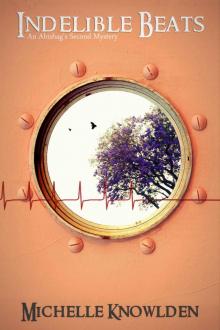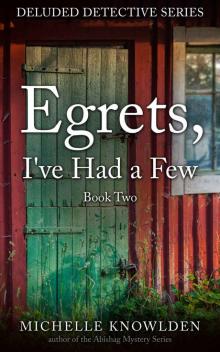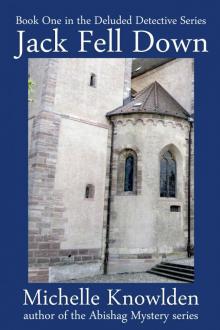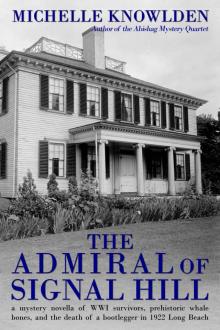- Home
- Michelle Knowlden
Indelible Beats: An Abishag's Second Mystery (Abishag Mysteries Book 2) Page 4
Indelible Beats: An Abishag's Second Mystery (Abishag Mysteries Book 2) Read online
Page 4
He nodded. “No one touched the fruit cake last night, but Harvey left a note saying he’d lay out breakfast things about 7:30.”
I cracked a third yawn, waved, and headed to my room. I fell instantly asleep.
Seemed only minutes later when someone bounced on my bed. I jerked awake to the smell of coffee and a Danish.
“Oh, good, you’re awake.” Kat bounced again for good measure. “Dog said you wanted to sleep for two hours, but it’s past 8:30. So wake up.’
I groaned, reached for the plate on the nightstand and tore off a piece of the pastry. When I tasted that first bite, I sat up. “This is fabulous.”
“Mmm.” A note of censure crept into Kat’s voice. “From a local bakery. Harvey doesn’t bake.”
I stopped chewing. “What about the fruitcake?”
“He got all shifty-eyed when I told him it looked good.” Her eyes narrowed. “I think he lied to Mister Cochrane about making it.”
I shrugged. “So what? We’re not going to be here all that long. Let it go.”
She straightened. “Can’t let it go. I think he killed Jordan.”
I crawled out of bed, rummaged through the suitcase for black leggings and a bright green sweatshirt splattered thickly and haphazardly with glitter and fabric paint. Our housemate Heather had made one for each of us. The night before I’d dressed in a Donavan-sanctioned outfit for the lawyer and the doctor, but today only Kat and Dog would see me. None of them cared if I had to roll up the sleeves of the sweatshirt, which hung to my knees.
Kat vibrated with impatience on the bed, but between the carols and the eighth time I’d sung the dreidel song, I’d decided that Jordan had shot himself with heroin. I wasn’t sure if it was the bare walls or the skin drawn so tightly against his bones or the resigned grief in Cochrane and Doctor Millerand. As someone said, no one had a motive to kill the artist. Everything I’d seen telegraphed Jordan Ippel’s unhappiness, so maybe he had been self-medicating.
Kat admitted to being a huge Jordan Ippel fan, so I couldn’t count on her to be objective. As far as a romantic rationalist could be, I would have to be the objective one.
I carried the coffee cup to the rocking chair. “What proof do you have that Harvey Kassem killed Jordan?”
A grim look of satisfaction crossed her face. The one thing she liked better than working on a murder case, was company while she worked on a murder case.
“I pulled the police report,” Kat said. Several of her Nefarious Crew were expert hackers, and she was no slouch on a computer herself.
I decided not to ask how she got the police report. When they hauled her off to prison, I’d need plausible deniability.
“Kassem called it in,” Kat continued. “He said he’d been in the kitchen, heard Ippel yell from his studio and found him unconscious with an empty syringe lying next to him. A blood test showed a lethal amount of heroin in his system. It was a miracle that he didn’t die instantly.”
A miracle that he’d been left brain dead and then unplugged to die? I didn’t say anything as Kat had that look in her eyes, a fanatical look that didn’t bode well.
As if guessing my thoughts, she said, “It was meant that he lived till now so we could find his killer and bring him to justice.”
Logic wasn’t working. “Okay, I’ll agree that nothing is at it seems. Doctor Millerand thinks Jordan was an activist, speaking for those in need. Aaron Cochrane saw him as a shy painter, solitary, hounded by the press. People see what they want to see.” I stared at her pointedly. “You don’t want to believe that your favorite painter killed himself so you’ve convinced yourself it was murder.”
Pulling her switchblade from a vest pocket, she stared moodily at her hiking boots. “Or maybe I can read the real Jordan in his work and know he wouldn’t kill himself. At least I’m not seeing him as a fairy tale hero.”
I choked on the coffee and sputtered, “I do not see him as a hero.”
She grinned wickedly,. “I knew it! You can’t help yourself. So you see him as a villain? Shame on you. What evil character have you cast him as? Darth Vader, an orc, a demon, or maybe it’s the wolf in the Three Little Pigs?”
“Dracula,” I said icily.
“You think he’s a vampire?” For a second, Kat looked personally insulted. Then she fell back laughing so hard, she dropped her switchblade.
Maintaining the frigid glare, I stood and smoothed down the sweatshirt. Glitter and flecks of paint sprinkled to the floor.
Kat stopped laughing and leaned urgently towards me. “Look, Les, humor me for a half day. Let’s talk to Harvey at breakfast and then to Ippel’s business partner. He’s coming over at 10:30 to pack up the paintings for the Sacramento exhibit. He knew Jordan Ippel the Artist, so he probably has the truest view of him.”
“I’m supposed to be doing my Abishag thing, not playing detective.” Even I heard the wavering in my voice. Shouldn’t bringing my husband peace in his last hours be my Abishag duty? Didn’t peace involve resolving the past first?
“Please?” She smiled winningly. “It could be my Christmas present.”
“You’re a heathen. You’re not supposed to celebrate Christmas.” I was weakening, and I knew she knew it.
“I’m an orthodox consumer, so I can get presents. Pretty please?”
I threw up my hands. “Okay, but it’s over by dinnertime. Agreed? If Jordan survives till tomorrow, I don’t want his last Christmas spoiled.”
“Agreed.” She jubilantly pocketed the switchblade. “If we don’t solve it by then, we’re off our game.”
We found porridge simmering in the slow cooker in the dining room, complete with the promised twigs. On a burner sat a fresh pot of coffee smelling of cardamom alongside a kettle for tea drinkers. Hardboiled eggs and a large bowl of woodland berries and cranberries created a tasty centerpiece on the rustic table. In untouched glory, the fruitcake sat in its glass dome in the center of the sideboard.
I liked my porridge loaded. In addition to the mysterious sprigs, I ladled in berries, walnuts, cranberries, and a heap of brown sugar. Because it was Christmas, I added full-strength whipping cream. I wouldn’t be seeing Donovan till New Year’s so I’d have time to lose the holiday weight, which I expected would be in the ounces. Being an Abishag wife is more active than you’d expect, what with all the investigating and running from killers.
By the time I’d settled at the table, Kat, who liked her porridge plain, had picked out the herbs and finished half of it. “Hurry up,” she growled. “He’s obviously avoiding us, so we’ll have to hunt him down.”
After we cleared the table, I took a cup of coffee to Dog and some gingerbread I found in the kitchen. With my first husband, Dog hadn’t been the only aide, but we didn’t want to share our Christmas with a stranger. We’d talked it over with Aaron and agreed that Dog and I could handle everything for a few days.
Dog needed a bathroom break. With Kat loudly complaining from downstairs, I rubbed my strange husband’s narrow hands and studied his face. In the glare of the La Jolla winter sun, he looked even more gothic and undead-like.
“Who are you?” I whispered.
Jordan’s eyelids fluttered, but his breathing didn’t change. He sounded no different than he had after he’d been sprung from life support, no different than those heavy, slow breaths through the long night. Maybe he would last till Christmas.
Dog returned, and we scheduled his breaks. Kat paced the foyer while I gingerly stepped down the fearfully high-pitched stairs. I hadn’t reached the bottom step when she stomped out the back door.
We didn’t find Harvey in the vegetable garden, side yard, garage, at the mailbox or in the unexpected topiary garden at the back of the property. Hedges, free-standing bushes, and pomegranate trees had been cut into the shape of birds—peacock, crane, goose, penguin, roadrunner, pelican, owl, and some I didn’t recognize. I stalled in delight, wondering if this was Jordan’s work. It showed an absurdity that I both hoped was his and hoped it wasn�
�t. It didn’t look as if anyone had pruned in weeks. If Jordan had created them, had he stopped due to despondency and an attempted suicide? Or had the killer—Harvey, for example—created them and after injecting Jordan, couldn’t continue with a heart so corrupted?
“Maybe Harvey went to the store,” I said when Kat practically trampled a flock of evergreen quail chicks following their mother along the fence line. Unmindful of nearly squashing the littlest one trailing far behind its siblings, she leaned over the fence peering in all directions for the housekeeper.
“The fridge and pantry are packed. He’s not at the store. Only one place left.”
Something shivered through me. “I don’t think…”
“He’s in the studio.”
CHAPTER SEVEN
The studio was locked, but I’d no illusions that would stop Kat. She extracted her picks and began working the lock when I heard someone call my name. Automatically I looked at the kitchen door before I realized the voice came from the driveway.
I blinked in surprise. “Sebastian?”
As he scuffed through pine needles with an incredulous expression on his face (surely mirrored on mine), Kat looked over her shoulder. Without moving her lips or stopping her break-in, she said, “Get rid of him.”
I moved towards Sebastian. “What are you doing here?”
“Hey, ’Du.” Sebastian hailed Kat, who had briefly reported to him when she worked as a gardener on the Crowder estate. Everyone shortened Kathmandu to Kat except Sebastian. Kat didn’t seem to mind ’Du from him. I tried it once, and it took hours for feeling to return to my arm.
“Hey,” she yelled back without stopping her work on the lock.
For one mad moment, I thought he’d been searching for me, maybe since we’d last seen each other at his grandfather Thomas Crowder’s funeral.
He squelched that thought with “Granddad owns the house across the street. I needed to check on it so I decided to stay through Christmas.”
Sebastian’s gesture indicated the house I’d noticed the day before with a single security light burning downstairs. I’d known Thomas owned a place in San Diego, but what were the odds of it being across the street from Jordan’s home?
“Why are you spending Christmas alone?” I demanded. “Where’s your mom? How about your brother and his family?”
He frowned. “No need to take that tone with me. You’re not my grandmother anymore.” I flushed, mortified, but he laughed. “Mom’s Portuguese relatives invited her to visit.”
I clapped my hands. “Oh, wonderful! But why didn’t you go?”
“Maybe next year. I’m working in the desert next semester and couldn’t line up anyone to check Granddad’s properties over the holidays. My brother and his family are in Colorado with his in-laws.”
He glanced at the house. “You know Jordan?”
He said it with such easy familiarity that instead of answering I blurted, “You know Jordan Ippel?”
“Neighbor of granddad’s for years. He taught me how to make stamps out of potatoes when I was six. Let me play no-holds-barred in his garden while Granddad and him argued over pre-Raphaelites and drank Talisker.” He shook his head ruefully. “Granddad wouldn’t let me in his garden without strict supervision and a raft of rules.”
Doubly disconcerted, I couldn’t picture the Thomas I’d studied in family videos and photo albums discussing art with a notorious artist. I certainly couldn’t picture shy Jordan, activist Jordan, many-married Jordan or suicidal Jordan drinking Talisker’s scotch whisky with a rather dull but happily married family man, a wealthy Palos Verdes businessman who, except for one night when a Portuguese ship crashed in the cove near his home, never did anything of note except make money and marry me.
That last thing probably didn’t count.
Sebastian glanced over my left shoulder. “I’ve been checking on Jordan because he’s…been unwell. How do you know him?”
“She married him.” Even in hiking boots, Kat had no trouble sneaking up on someone. I had a clear view of the consternation that crossed Sebastian’s face before she grabbed my sleeve. “I’ve got the studio open. Let’s check it out.”
Sebastian tagged along. From the corner of my eye, I saw his jaw working and wondered if it bothered him that his grandfather’s Abishag had remarried.
“So you’re an Abishag wife again.” His voice sounded flat but not judgmental. “I thought you were dating a lawyer.”
“I am,” I said. “I mean, I was. I’m taking a break. A short break. Jordan was taken off life support last night.” Too late, I realized I could have been more diplomatic.
Sebastian stalled at the steps to the studio.
Kat leapt up the steps and disappeared into the dimness that smelled of paint thinner and cured leather.
I fumbled for his hand and squeezed it. “I’m sorry, Sebastian.”
He pulled his hand from mine and ran it though the dark hair that always looked like he’d been wrestling with it. “I knew it was bad. Harvey keeps in touch. He didn’t tell me Jordan had gotten an Abishag wife.”
“You know Harvey?”
He tugged at his hair again. “He went to school with my brother. Granddad vouched for him when Jordan was looking for an assistant.”
“Get in here, you guys.”
Sebastian reacted immediately to the urgency in Kat’s voice and vaulted up the steps. I stalled, casting a quick look to Jordan’s bedroom window before creeping into the gloom.
Dirty light slanted though the studio windows, making no inroads into the shadows and sinister pools of darkness that filled the small bungalow. A blank canvas sat on an easel, and stacks of empty canvases leaned against three walls of the studio.
The fourth wall was an open divider leading into the back third of the studio, an immense safe like the kind you see in banks. The open safe revealed hundreds of paintings in racks and one on a drafting table in the center of the lighted open space.
Sebastian examined the door of the safe. “How’d you open this?”
Engrossed with the painting on the drafting table, Kat murmured, “Cracked it.”
As in the house, no art hung on the studio walls which made the painting she studied stand out. I recognized it from the article Kat had shown me.
“Is that…” Sebastian began.
“Indelible Beats,” Kat said, wide-eyed. “But not Jordan Ippel’s Indelible Beats.”
CHAPTER EIGHT
“How do you know?” Sebastian moved closer to Kat and peered at the picture.
Visibly distressed, she pointed at the bottom right quadrant where the amber-threaded paint strokes swooped to meet a more thickly layered paint of grays and browns with amber flecks. That’s how I, having no artistic background, saw it.
Apparently Sebastian wasn’t so handicapped. “Color or strokes?”
“Strokes.” She sighed miserably. “I had a professor who spent an entire lecture waxing lyrical over those corner strokes, how Ippel executed the exact stop and paint thickness to each stroke. He said that was the true indelible beat to the painting, one that couldn’t be duplicated.” Her face darkened. “Looks like someone tried.”
“How do you know the painting your professor showed was the real one?” I asked.
Kat looked at me with pity. “Instructors always go back to the original. This is good, but anyone who really studied Ippel would know it’s a forgery.”
“We should talk to Joss Royce.” Sebastian squinted thoughtfully at the amber strokes. “He’ll have photos of the original. He can have an expert of Jordan’s paintings look at it.”
“Wouldn’t Mister Royce be the expert?” I asked. “Seems like he’d know, being Jordan’s partner.”
“Business partner,” Kat said. “Doesn’t mean he knows anything about art.”
I moved to the doorway for air. Standing between the house where Jordan waited for death and the studio with a potential forgery, I shifted uncomfortably. Peace. Serenity. I hadn’t come to cause
discord.
“Joss Royce is coming over this afternoon,” Kat said to Sebastian. “We’re crating paintings for an exhibit.”
“Including this one?” Sebastian asked.
Kat shrugged. “It’s always a big draw, but I don’t know the subject of the exhibit.”
“‘Voiceless,’” I said. “‘A Retrospective of Jordan Ippel in Glottal Stops.’ That’s the title of the exhibit.”
“Then it would be included,” Sebastian said.
Kat exhaled. “Yeah. Indelible Beats was his signature piece during his Glottal Stop period.”
I glanced again at the house, trying to mask my irritation with their easy understanding of Jordan’s art. I was married to the guy, and I didn’t understand half of what they said, much less what they saw.
A movement across the street caught my eye. “Hey,” I shouted. Harvey stepped into a small, scraped blue Toyota. “Wait,” I yelled, pounding down the steps and racing down the driveway.
Although he must have heard me, he never looked my way. Hunched over the steering wheel, he roared off in a gray haze of exhaust.
I skidded to a stop at the curb. He’d fled the scene like a guilty man. I’d put no credence in what Kat said about him, even giving him more credit when I’d learned he was a friend of Sebastian’s brother (theoretically my older grandson), but this behavior seemed highly suspicious.
“That’s weird,” Sebastian said. He and Kat joined me at the curb, staring at the trail of grey smoke.
“He did it.” With satisfaction, Kat pointed an accusing thumb in the direction of Harvey’s retreat. “Him running proves it.”
“Did what?” Sebastian asked.
Focusing on the more important, I wailed, “Who’s going to make lunch now?”
* * *
In a foul mood, I sat with Jordan while Dog took a break. When I apprised Dog of the latest happenings—Kat’s theory about Harvey killing Jordan, the discovery of the forged painting, Sebastian’s appearance, Harvey’s flight—Dog also didn’t seem the least concerned about what should have been the prime issue. Who was going to feed us for the next two days? Kat, Dog, and I lived on packaged food during the week and take-out on the weekends. None of us knew how to cook.

 Indelible Beats: An Abishag's Second Mystery (Abishag Mysteries Book 2)
Indelible Beats: An Abishag's Second Mystery (Abishag Mysteries Book 2) Sinking Ships: An Abishag's First Mystery (The Abishag Mysteries Book 1)
Sinking Ships: An Abishag's First Mystery (The Abishag Mysteries Book 1) Riddle in Bones: An Abishag’s Third Mystery (The Abishag Mysteries)
Riddle in Bones: An Abishag’s Third Mystery (The Abishag Mysteries) Egrets, I've Had a Few (Deluded Detective Book 2)
Egrets, I've Had a Few (Deluded Detective Book 2) An Eggshell Present: An Abishag’s Fourth Mystery (Abishag Mysteries Book 4)
An Eggshell Present: An Abishag’s Fourth Mystery (Abishag Mysteries Book 4) Jack Fell Down: Deluded Detective Book One (Deluded Detective Series 1)
Jack Fell Down: Deluded Detective Book One (Deluded Detective Series 1) The Admiral of Signal Hill
The Admiral of Signal Hill